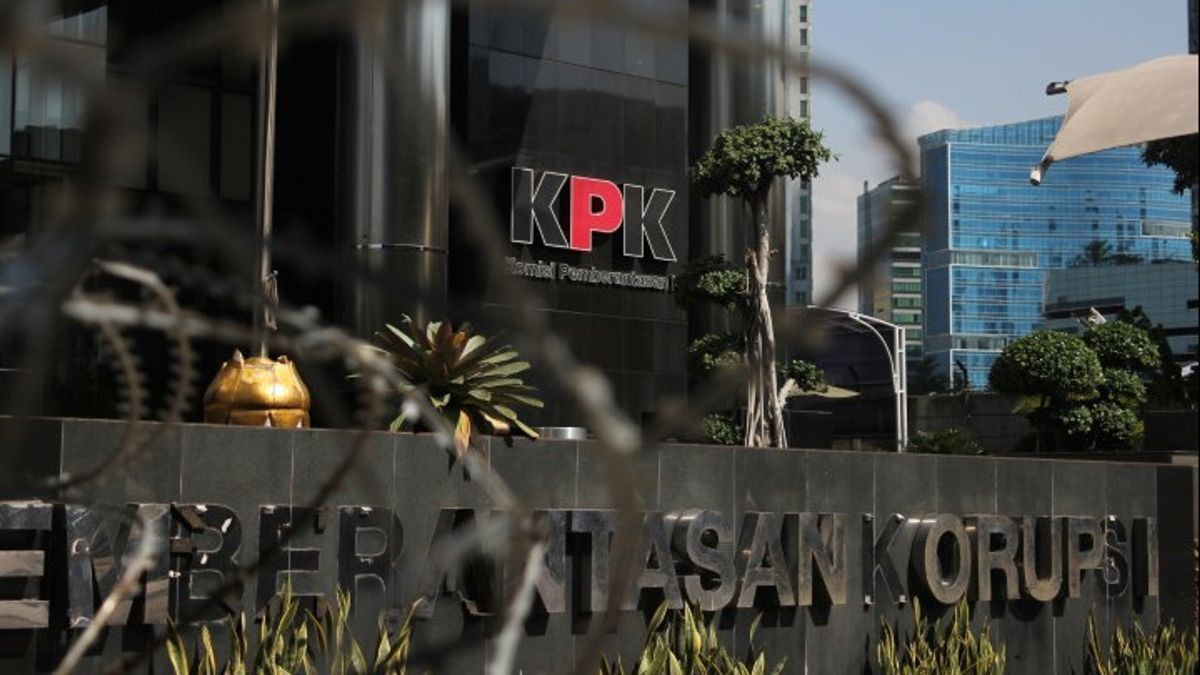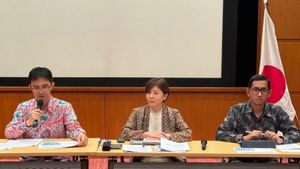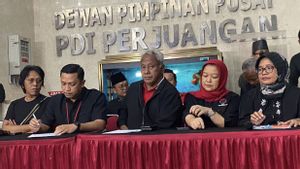JAKARTA - The issue of the Taliban within the Corruption Eradication Commission (KPK) has returned to strength. A series of efforts to investigate corruption cases, especially the social assistance for COVID-19, are the culprits.
Moreover, this issue was raised as the government incessantly deflated the anti-graft institution's performance. The KPK, which initially had to be independent, was one step further dictated by the oligarchic elite.
However, the issue of the Taliban is not new. Two years earlier, the issue of the Taliban group was also raging. The following are the findings compiled by the VOI team.
Based on its history, the KPK is a state institution that was formed with the aim of increasing the effectiveness and effectiveness of efforts to eradicate corruption. The KPK was founded in 2002, through a long history until today it is threatened with being 'killed off'.
And in a short time, the weakening of the KPK was present through a law product. As a result, the higher the performance of the KPK in catching corruptors, the more intense efforts to weaken the institution are.
One of them is by reviving the issue of radical Taliban who are considered to be a thorn in the flesh of the KPK. The KPK investigator, Novel Baswedan, later dismissed the issue.
Novel actually criticized the issue of the alleged Taliban being intensified as an attempt to deflate the KPK. Even the novel does not hesitate to tweet via twitter calling the issue of radical Taliban nothing more than an old song.

The tweet was revealed by the novel while commenting on the @paikodirajo account which said there was a mission being carried out referring to the momentum when the revision of the KPK Law was successfully applied in 2019 ago.
"The issue of radical-taliban, old songs," the novel tweeted through his personal account @nazaqitsha.
Novel added that this issue often appeared suddenly when the KPK was working and some felt annoyed. Therefore, Novel ensures that all forms of Taliban issues with their various narratives are laden with slanderous content.
"If the issue is raised, usually their interests are disturbed by the KPK and so far this has been the case. If the KPK is working properly to fight corruption, then they, the supporters of corruptors, will attack using the issue," said Novel as quoted by Detik.
"What is sad is the recent use of the Taliban's radical issue is considered quite effective because quite a lot of people are consumed by the issue," he added.
In line with Novel, former KPK spokesman Febri Diansyah also commented on the issue of the Taliban. Febri suspects that the attack on the Taliban issue was launched when the KPK was investigating a large corruption case involving a number of government ministers, Joko Widodo (Jokowi).
"It seems like the issue of the Taliban with the 2019 video before the student demonstrations re-emerged. At the same time, the handling of the Covid-19 Social Assistance Corruption case began to warm up. Still selling the Taliban issue at the KPK?" Febri tweeted @febridiansyah.
The origin of the KPK's Taliban issueI just saw a few mentions, it seems like the issue of the Taliban with the 2019 video before the student demonstrations re-emerged. At the same time, the handling of the Covid-19 Social Assistance Corruption case began to warm. What's wrong? Hmm ... Still selling the Taliban issue at the KPK? 😊
- Febri Diansyah (@febridiansyah) January 23, 2021
It is possible that the Taliban group itself was an Islamic fundamentalist group that controlled Afghanistan from 1996 to 2001. Historically, the Taliban was formed in the 1990s by the Afghan mujahidin or Islamic guerrillas who fought against the Soviet occupation of Afghanistan (1970-1989).
This movement was dominated by Pashtuns who became known as radical militants. However, their movement often commits human rights violations in Afghanistan.
The common thread between the Afghan Taliban group and the KPK Taliban is in terms of militancy. The term was first coined by the Chairman of Indonesia Police Watch, Neta S. Pane in 2009.
In his press release, Neta commented on open letters from around 50 Indonesian Police investigators who served at the KPK. They - police investigators - questioned the appointment of 21 investigators who became independent investigators at the institution. For that, Neta wrote that there was a split in the KPK into two camps, namely the Indian police and the Taliban Group.
"The Indian police refer to the KPK investigators who come from the National Police institution. Meanwhile, the Taliban Group referred to investigator Novel Baswedan who was supported by the KPK Employees Forum. This group, mentioned in the letter, is also considered militant because it often questions the policies of the leader, "said Linda Trianita, Anton Aprianto and Mustafa Silalahi in a writing in Tempo Magazine entitled Taliban in the KPK Leaders Selection (2019).

The issue of the Taliban is getting more and more heated when a number of lawyers who often handle cases at the KPK admit to hearing the term a Taliban stronghold in the KPK. Moreover, the Taliban stronghold is considered to have always handled cases with big names. Because of this, the name Novel Baswedan emerged, which was associated with a conservative Islamic group — only because he had a thick beard and often had a religious style.
Afterwards, a number of law enforcers at the KPK stated that the issue of radicalism - in the form of the Taliban Group - was the selection committee's way of tackling Novel Baswedan's steps to lead the KPK. The accusation is reasonable.
This is because the selection committee has partnered with the National Counterterrorism Agency (BNPT) and the State Intelligence Agency (BIN) to trace the track records of candidates for KPK leadership candidates. The selection committee argued that the elected candidates did not want to be exposed to radicalism. It is feared that this understanding will worsen conditions at the KPK.
Later, the issue of the Taliban has shocked the virtual world, especially Twitter. The issue developed rapidly as an effort to weaken the KPK. The weakening of the KPK has taught the public that social media is easily hijacked by the oligarchic elite through cyber troops and computational propaganda.
As revealed by the founder of Drone Emprit (DE), Ismail Fahmi. Based on DE research, the movement to weaken the KPK is supported by the presence of massive cyber troops carrying out attacks against movements that oppose revision. The debilitating hashtags, among others, read the KPK, #KPK andTaliban, #KPKPatuh Rules, #KPKCengeng and so on.
“The Taliban's KPK hashtag has succeeded in making the public doubt the KPK and suspecting the anti-graft agency as a hotbed of radicalism. In his description, DE concluded that the movement of academics who carried out the Twitter campaign was sporadically defeated by the much more massive and systematic hashtag of the KPK Taliban. This has led DE to conclude that there is a phenomenon of the death of expertise, aka the death of expertise, "concluded Widjayanto DKK in the book Saving Democracy (2020).
* Read other information about the KPK or read other interesting articles by Detha Arya Tifada.
MEMORY OtherThe English, Chinese, Japanese, Arabic, and French versions are automatically generated by the AI. So there may still be inaccuracies in translating, please always see Indonesian as our main language. (system supported by DigitalSiber.id)










